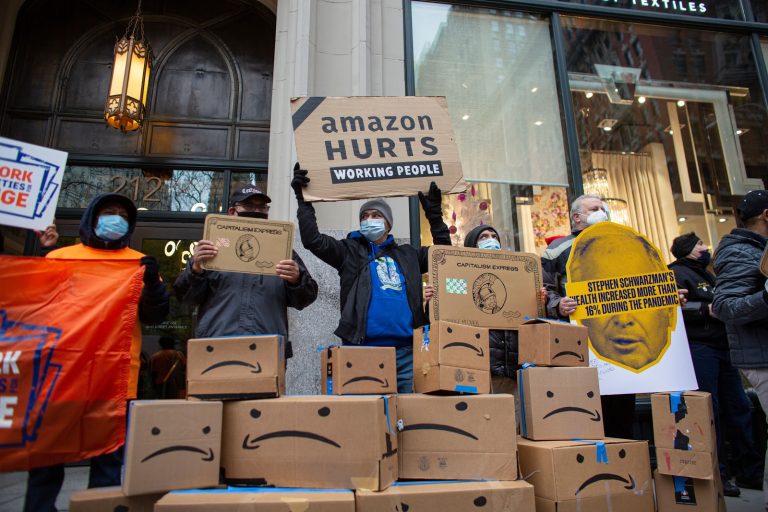With growing concern among the U.S. public about how much power Big Tech companies have, some concerned politicians and experts are trying to rein in the conglomerates. President Joe Biden’s administration recently nominated and appointed two young scholars who focus on Antitrust Law and have argued against Big Tech.
On March 22, Biden nominated an Associate Professor of Law from Columbia University, Lina Khan, to be a Commissioner on the Federal Trade Commission (FTC). Khan received some acclimations for her 2017 article Amazon’s Antitrust Paradox, which was published in the Yale Law Journal. Khan has been viewed as a progressive, and if approved by the Senate, will become part of an FTC that has a Democratic majority. Her nomination, along with a potential repeal of Section 230 of the Communications Decency Act by the Biden administration, may signal Democrats are planning on getting tough on the Big Tech cartel.
In an NPR interview, Khan said that she thinks there are “blind spots” in the current antitrust approach. She thinks that although Big Tech companies are offering products that are free, we pay by giving up our data. Khan says this “complicates how antitrust looks at these issues.”

Regarding Amazon, Khan said, “We have a very meager understanding of how the different parts of its businesses actually interlink and how it potentially uses data collected in one market to advantage itself in another market and that sort of thing.” She said one potential solution would be “separating the marketplace from Amazon to private label.” According to Khan, this would give Amazon the ultimatum of either being a marketplace open to third-party sellers or a first-hand company that sells things, but not both.
Khan has experience being on a House Judiciary Committee panel which did a 16-month investigation on Apple, Amazon, Facebook, and Google. The panel decided to designate the companies as monopolies, suggesting “structural separations.”
Success
You are now signed up for our newsletter
Success
Check your email to complete sign up
However, Khan’s support has not been unanimous and was recently criticized by Sen. Mike Lee (R-UT). Lee issued a statement on March 9 expressing his concern about Khan’s potential as an FTC Commissioner, saying Khan “Lacks the experience necessary for such an important role as FTC Commissioner.”
“Her views on antitrust enforcement are also wildly out of step with a prudent approach to the law. Nominating Ms. Khan would signal that President Biden intends to put ideology and politics ahead of competent antitrust enforcement, which would be gravely disappointing at a time when it is absolutely critical that we have strong and effective leadership at the enforcement agencies.”
“This moment is too important for our antitrust enforcers to be learning on the job,” added Lee.
Biden also appointed Tim Wu to the National Economic Council. He is also a Columbia Law Professor specializing in Antitrust Law and its application to Big Tech. Wu has experience as an advisor to the FTC during the Obama administration.
Sen. Amy Klobuchar (D-MN) took a very different position on Khan from Sen. Lee, “What I think is exciting about people like Tim Wu and Lina Khan is, they’re disrupters,” she told NPR. “I say we need some disruption right now, both in how we look at this in government and how we can get more competitors going.”
Curbing Big Tech
A March 27 article by Associated Press outlines the effort being made throughout the U.S. to curb Big Tech companies’ power. Sen. Michael Gianaris (D-NY) was thrilled at first when Amazon announced the opening of a facility in his riding. Still, when he learned Amazon would be given $3 billion in tax breaks through “secretive negotiations” with state and city leaders, Gianaris became very concerned. He is now pushing for new antitrust laws in New York, hoping to set a new legal standard of “abuse of dominance.”
Gianaris told AP, “Our antitrust laws have atrophied, and they’re not equipped to handle the 21st century and anti-competitive practices…Traditional antitrust enforcement doesn’t work because Big Tech has become too big and too powerful.”
Similar “techlash” efforts are being made throughout the U.S., according to the article.
Sen. Bill Ferguson (D-MD), who supports a law that would tax Big Tech companies for profits made on advertisements, said, “Companies like Amazon, Facebook and Google have seen their profits drastically increase during the COVID-19 pandemic while our Main Street businesses are struggling to keep up,” in comments to AP.
















